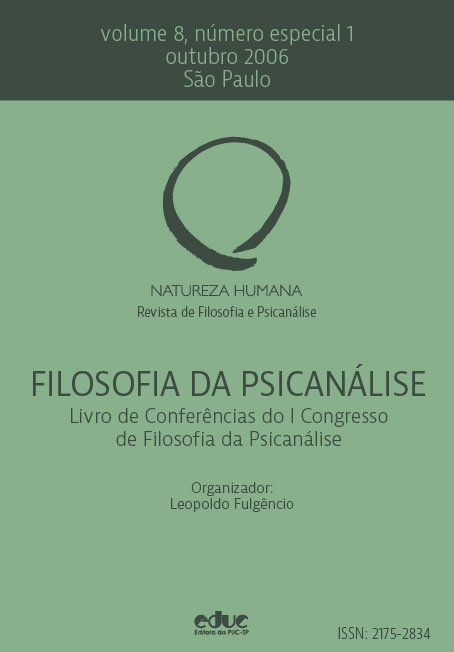La ontología dei psicoanálisis
DOI:
https://doi.org/10.59539/2175-2834-v8nespecial1-674Palabras clave:
explicação; compreensão; relatividade ontológica; psicanálise; epistemología.Resumen
Este trabajo asume dos supuestos referidos a los compromisos ontológicos de las teorías. EI primero de ellos los considera epistemológicamente relativos a ellas, pues éstas establecen Ias consideraciones objetivantes que hacen posible Ia constitución de los objetos que trata. El segundo asume que el tratamiento de esas consideraciones se lleva a cabo en un marco epistémico que Ias distribuye y evalúa. Podríamos pensar, siguiendo a Dilthey, que tales demarcaciones regionales son relativas a determinados tipos de procedimientos. Tendríamos, así, dos realidades: una, relativa a un conjunto de procedimientos científicos experimentales, Ia realidad física. Frente a ella, otra, relativa a los procedimientos hermenéuticos, Ia realidad histórica. La primera, susceptible de explicación, Ia segunda, sólo de comprensión. El análisis de tres reconstrucciones del psicoanálisis freudiano, llevadas a cabo por Ricoeur, Grünbaum y Hopkins, respectivamente, pretende mostrar los límites de Ia adhesión a un único conjunto de procedimientos. La propuesta se dirige a mostrar que comprensión y explicación no tienen un carácter dicotómico y que, ninguno, por sí solo, constituye una ontología. Si pudiera mostrar una ciencia cuyos procedimientos no son sólo de un tipo u otro, sino que los amalgama, entonces, tal ciencia representaría, de modo legítimo, una problematización de tal oposición. Ello nos obligaría a una revisión de la metateoria que Ia hizo posible. Mi pretensión es que el psicoanálisis freudiano sea tal ciencia. Palabras clave: explicación; comprensión; relatividad ontológica; psicoanálisis; epistemología.Descargas
Publicado
2024-05-17 — Actualizado el 2006-05-17
Cómo citar
Minhot, L. (2006). La ontología dei psicoanálisis. Natureza Humana - Revista Internacional De Filosofia E Psicanálise, 8(especial1), 63–89. https://doi.org/10.59539/2175-2834-v8nespecial1-674
Número
Sección
Artigos








